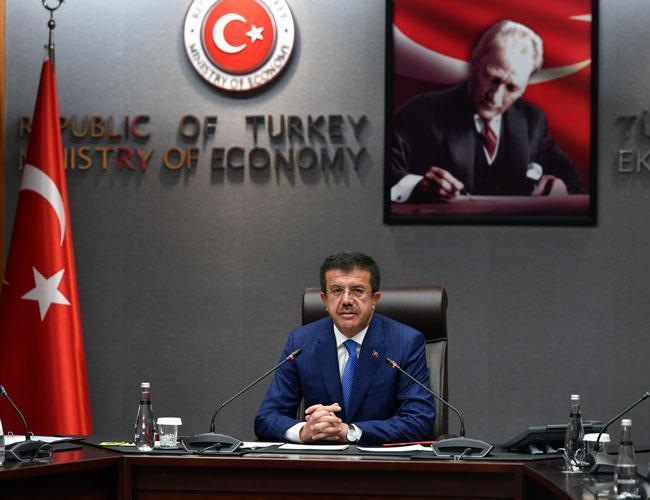
The United States’ demand to stop trading oil with Iran is not binding for Turkey, a top Turkish official has said, adding that Turkey would only follow a United Nations decision regarding this issue.
During a press meeting in Ankara on June 27, Economy Minister Nihat Zeybekci noted Turkey would pay attention so that its friend Iran will not face any unfair actions due to such actions.
The U.S. has told countries to cut all imports of Iranian oil by November and is unlikely to offer any exemptions, a senior U.S. Department of State official said on June 26 as the Trump administration ramps up pressure on allies to cut off funding to Iran.
“The decisions taken by the United States on this issue are not binding for us. Of course, we will follow the United Nations on its decision. Other than this, we will only follow our own national interests. In addition, we will pay attention so our friend Iran will not face any unfair actions,” Zeybekci said.
U.S. President Donald Trump in May said his administration was withdrawing from the “defective” nuclear deal agreed between Iran and six world powers in July 2015, aimed at curbing Tehran’s nuclear capabilities in exchange for the lifting of some sanctions, and ordered the re-imposition of U.S. sanctions against Tehran that were suspended under the accord.
“Yes, we are asking them to go to zero,” the official said on June 26 when asked if the U.S. was pushing allies, including China and India, to cut oil imports to zero by November.
“We’re going to isolate streams of Iranian funding and looking to highlight the totality of Iran’s malign behavior across the region,” the official told reporters speaking on condition of anonymity, as reported by Reuters.
Turkey strives for the development of free trade around the world, Zeybekci also said.
“Turkey acts in a more responsible way for the improvement of global trade and we have shown an effort for the development of free trade among countries,” he said.
Updating Customs Union deal
Zeybekci said Turkey has signed 24 free trade agreements and one preferential trade agreement, adding Ankara is still in talks to sign deals with some countries, including Mexico, Columbia and Peru.
His remarks came two days after Turkey and the European Free Trade Association (EFTA) countries—Iceland, Liechtenstein, Norway, and Switzerland—signed an agreement to expand their free trade agreement (FTA).
The first FTA, which covers trade in industrial products, fish and marine products, and processed agricultural products between Turkey and EFTA countries, was signed in 1991, according to the EFTA’s website.
Zeybekci said the deal with EFTA countries, updated to modern day circumstances, is the “most comprehensive” free trade agreement that Turkey has signed so far.
He added the updated deal will cover more areas such as services, electronics, tourism, health and transportation.
Zeybekci said Turkey’s bilateral trade volume with EFTA countries was $9.7 billion in 2017 and direct investment from EFTA to Turkey was $3.4 billion.
“In the next couple of years, our trade with the region will likely double or even triple,” he said.
“We wanted our updated agreement with the region to serve as a model for the planned modernization of our Customs Union deal with the European Union,” the minister also said, adding that Turkey took quite positive feedback over the update of the deal from many EU countries, including Germany.
“I believe the process will accelerate. We believe the update of the deal with the EU will be on the table by this autumn,” Zeybekci said
Potato imports from Syria
Zeybekci also said Turkey recently allowed potato imports in a limited amount from Syria to curb skyrocketing prices.
“We have allowed potato imports from some parts of Syria where Turkey undertakes operations in a very limited amount. Our imports will only be 1 percent of Turkey’s potato demand, which is around 4,000 tons. We import potatoes from Syria in Turkish Liras. This factor has played a key role in pushing down the prices in the domestic market,” he said.
In an effort to curb prices last week, the government decided to allow potato and onion imports in certain amounts from some countries.
In Istanbul, the cost of one kilogram of onions rose 212 percent to 6.5 liras ($1.5) over the past month. One kilo of onions was sold for around 1.3 liras last June. Potato prices also rose to 6 liras ($1.4) in June, a 94 percent month-on-month increase. One kilo of potatoes was around 1.5 liras last June.